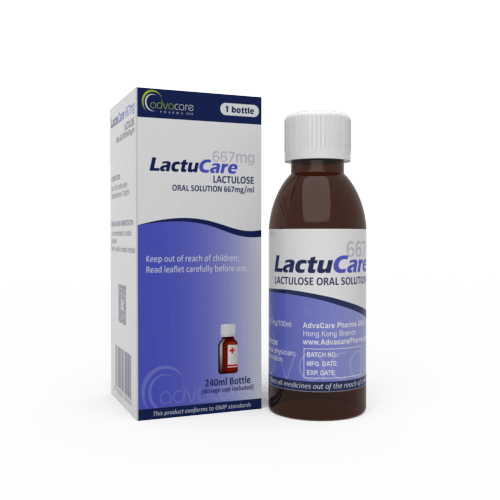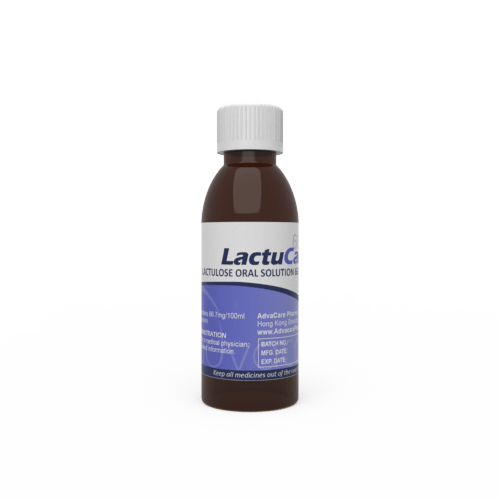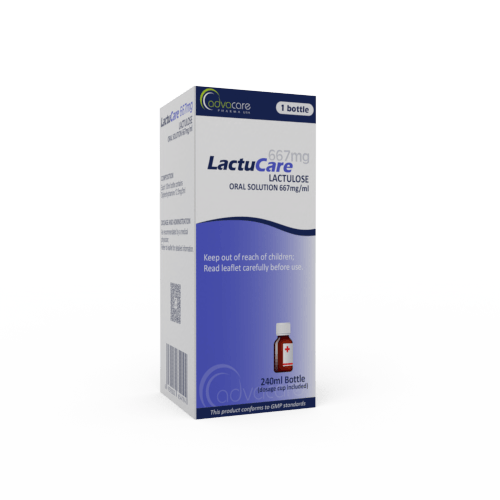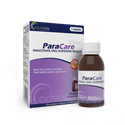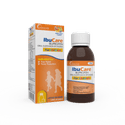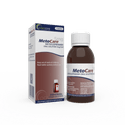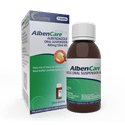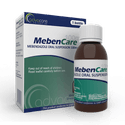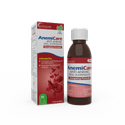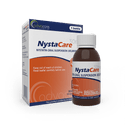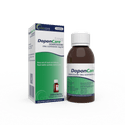- Home›
- Pharmaceuticals›
- Pharmaceutical Suspensions›
- Oral Suspensions›
- Lactulose Oral Solution
Lactulose Oral Solution
Dosage
Packaging
What is Lactulose?
Active Ingredients: Lactulose
Lactulose Oral Solution is a laxative drug used to treat constipation. This medication is suitable for patients suffering from chronic constipation. A bowel movement is typically produced 24-48 hours after treatment. Lactulose may also be prescribed as an adjunct to prevent hepatic encephalopathy.
Lactulose is a synthetic disaccharide that is derived from lactose. It is a colonic acidifier and an osmotic laxative. It works to relieve constipation by increasing water in the bowels, which helps soften stool.
Lactulose Oral Solution is available with a dosage of 667mg/ml (67% w/v). It is available in a 240ml bottle. This drug may contain minor quantities of other types of sugars, such as lactose, fructose, and galactose. This medicine is intended for oral administration.
Lactulose Oral Solution is a GMP-certified product that has been manufactured by AdvaCare Pharma. This medication is a part of our extensive catalog of medical supplies available for exportation. Our manufacturing facilities are located in China, India, and the USA.
Why are we a quality Lactulose manufacturer?
AdvaCare Pharma, a GMP-compliant pharmaceutical company, specializes in the manufacture of Lactulose Solution. Our strategic manufacturing locations and innovative management systems ensure full control over the supply chain, resulting in enhanced quality standards and decreased costs throughout the production, transport and import processes. As a trusted Lactulose manufacturer, we globally supply a comprehensive range of 55+ oral liquid medicines in solution dosage form to more than 65 countries.
Uses
What is Lactulose Oral Solution used for?
It is used to relieve constipation. It is also used to treat or prevent complications due to hepatic encephalopathy.
Can Lactulose Oral Solution be used for chronic constipation?
Lactulose Oral Solution can be used to treat chronic constipation in adults and children. This medicine helps to increase the frequency of bowel movements in individuals suffering from long-lasting constipation. Though it is not usually a first-line treatment for chronic constipation, it is considered a safe and effective medication.
Can Lactulose be mixed with other available over-the-counter laxatives?
For most individuals, lactulose will be strong enough to treat constipation and should not be mixed with over-the-counter laxatives. If lactulose does not provide relief, it is important to consult a doctor or pharmacist before mixing with any over-the-counter laxatives, as there are drug interactions and an increased risk of side effects, such as diarrhea, pain, and gas.
How is Lactulose Oral Solution used?
This medication is manufactured as a liquid. It is intended to be taken orally, though there may be clinical situations in which rectal administration is appropriate.
This liquid can be mixed with juice, milk, or water, which may help reduce the incidence of nausea as a side effect. It is recommended to take the medication before sleeping, as it may take 6-8 hours for the effects to show. It should be noted that it may take 2-3 days for the treatment to work.
Lactulose may interfere with the absorption of other medications, so it is recommended to take it at least 2 hours after other medications.
During treatment, it is recommended to drink 6-8 glasses of fluids. If after a few days of treatment, there have been no therapeutic effects, the patient is advised to consult with a physician.
What dose should be taken?
Adult Dosing For constipation, the usual dose is 30mL (20mg of lactulose), taken every day. The maximum dosage is 60mL per day. It may take 24-48 hours for a response. When used for the initial treatment, the dosage is 15ml-45ml daily, and as maintenance therapy, it is typically 10-30ml per day.
For portal-systemic encephalopathy, the usual dose is 30-45ml, taken 2-3 times per day. For the initial phase of treatment for acute episodes, 30-45mL should be taken every 1-2 hours until 2-3 soft stools are present. Alternatively, for patients with impending coma with the danger of aspiration or those with endoscopic/intubation interference, 300mL can be diluted with 700mL of water for retention enema every 4-6 hours. The dose should be adjusted to produce 2-3 soft stools per day. Long-term therapy may be necessary to reduce the severity and prevent recurring episodes.
Renal and hepatic dosing are not defined for this medicine.
Pediatric Dosing For constipation, the usual dose is 1-3mL per kg per day, divided and given 1-2 times per day. Typically, the dosing is as follows:
- adolescents: 15-45ml per day
- children from 7-14 years old: 10-20ml per day
- children from 1-6 years old: 5-10ml per day
- infants: 5ml per day
For portal systemic encephalopathy, the usual dose is as follows:
- children and adolescents: 40-90mL per day, divided and given 3-4 times per day.
- infants 2.5-10mL per day, divided and given 3-4 times per day.
Refer to a doctor or pharmacist for guidelines on dosage.
Who can use lactulose?
Lactulose Oral Solution can be given to adults and children, but caution is advised for specific groups of patients.
Pregnant This medication is considered safe for use in pregnant women. Though all medicine should be avoided if non-drug treatments are available, it should be avoided during the first trimester of pregnancy if possible. It is recommended to use the lowest recommended dose. Prolonged use of this medicine may lead to electrolyte imbalances.
This medication is considered safe for use by breastfeeding mothers. It is not known whether lactulose is excreted in milk. However, it is known that this drug is minimally absorbed by the gastrointestinal tract. It should be noted that special considerations may need to be made for mothers who are nursing neonates or infants born prematurely, with a low birth weight, with gastrointestinal impairment, or other serious illnesses.
Children There is very little research or information concerning the use of lactulose in pediatric patients. In general, the goal of treatment is to produce 2-3 stools per day, and if diarrhea occurs, the dose should be reduced. It should be noted that the defecation reflex may be altered during treatment for children under 6 years old and that infants may develop hyponatremia and dehydration.
Geriatric It has been reported that this medicine may cause increased nausea in this population. In general, lactulose is not the recommended first-line treatment for constipation in this population.
How should Lactulose Oral Solution be stored?
It is recommended to store the medicine in its original packaging and to keep it in a dark, dry location at room temperature (around 25°C). It should be kept out of direct light or excessive heat, as this may affect the integrity of this drug. The solution should be kept from freezing. It should be noted that the liquid may darken over time and that this color change does not affect the efficacy of lactulose.
Before opening the bottle, the expiry date should be checked. The medicine can be kept for up to 12 months after opening. If the texture of the medicine has changed or the color has significantly darkened, the medicine should be discarded.
The medicine should be kept out of reach of children. Unused medicine should not be flushed down drains, and it should be disposed of according to local guidelines.
Other warnings
For patients with lactose intolerance or glucose-galactose malabsorption syndrome, this medicine should be used cautiously.
For patients with diabetes mellitus (diabetes type 1), high doses of this medicine should be given with caution. It is important to note that there have been reports of hyperglycemia in diabetic patients, and other treatments should be considered.
Lactulose oral solution is contraindicated for patients with a low-galactose diet requirement.
It is recommended to monitor electrolytes in elderly patients or debilitated patients undergoing prolonged treatment of over 6 months.
Patients with upcoming proctoscopes or colonoscopies are advised to undergo a thorough bowel cleansing with a non-fermentable solution before any electrocautery procedures.
Side Effects
As with all pharmaceuticals, some unwanted effects can occur from the use of Lactulose Oral Solution.
Common side effects include, but may not be limited to:
- bloating, gas, and abdominal distention
- flatulence
- abdominal cramps
- vomiting or nausea
Call your doctor if any of the following symptoms develop:
- severe diarrhea
- changes in heart rate
- decreased urine
- mood changes like confusion or irritability
- seizures
- muscle twitching
- signs of an allergic reaction
- excessive tiredness or weakness
High-dose therapy with lactulose has been associated with the following serious reactions:
- severe diarrhea
- electrolyte disorders
- metabolic acidosis
For a comprehensive understanding of all potential side effects, consult a medical professional.
If any symptoms persist or worsen, or any new symptoms appear, please call your doctor.
Precautions
Do NOT use Lactulose Oral Solution if:
- You are allergic to any of the ingredients.
- You have galactosemia (unable to metabolize galactose).
- You have an intestinal obstruction.
Lactulose is known to interact with many different drugs. Among the drugs which may interact with Lactulose are droperidol, levomethadyl, acenocoumarol, dicumarol, lithium, phenprocoumon, and warfarin. Other laxatives should not be used during treatment with lactulose.
Lactulose is also known to interact with licorice. It is recommended to avoid alcohol and tobacco use during treatment.
This medication may not be suitable for people with certain conditions. It is important to consult with a doctor if you have any health conditions, including:
- diabetes
- diet low in lactose or galactose
- lactose intolerance or glucose-galactose malabsorption syndrome
- upcoming medical procedures such as a colonoscopy or proctoscopy
References
Lactulose may reduce Clostridium difficile-related diarrhea among patients receiving antibiotics
The main objective of this retrospective study was to determine whether concomitant lactulose administration affected Clostridium difficile infection in patients who received antibiotics.
This study included a review retrospectively of medical records in a hospital over a period of 1 year. Patients treated with antibiotics were considered for this study and were evaluated for the development of C. difficile infection, as well as concomitant lactulose therapy. Patients that received lactulose were compared to patients that did not receive lactulose.
Results showed that patients who received lactulose and antibiotics were older (n = 87, mean age 67) than patients who received antibiotic therapy alone (n = 103, mean age 60). Only 2 patients (2.3%) of the patients who received lactulose and antibiotics received C. difficile infection while 10 (9.7%) of the patients who received only antibiotics had C. dificile infection.
The conclusion of this study is that the administration of lactulose may reduce the incidence of C. difficile-related diarrhea among hospitalized adult patients receiving antibiotics.

You might be interested in...
Why AdvaCare Pharma?
As an industry leader, we are aware of our responsibility to provide affordable and sustainable solutions to improve healthcare worldwide.
